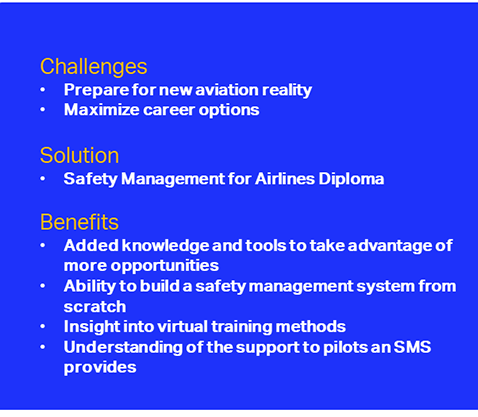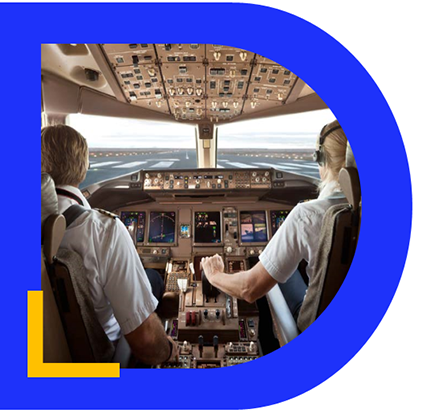
For Celso Zoschke, the IATA Safety Management for Airlines Diploma is a passport to exciting, new opportunities.

Specialized in:


Aviation has been in my life since I was about eight years old. I read all Saint-Exupéry’s and Richard Bach’s books, built countless model airplanes, and regularly visited our local airport with my brother, to persuade people to give us rides in their light aircraft. Naturally, I became a pilot; first flying parcel planes, then light business aircraft, and later Airbus passenger planes. I was also always involved in instruction and training, and this enabled me to make a switch to a big ATO as an instructor, policy/compliance manager and course designer after 19 years, to be more present for my family.
It was a very rich and fruitful experience that enabled me to see behind the scenes of aviation: how things are done, how departments work with each other; giving me a completely different perspective of the industry. Unfortunately, it was hit by the COVID crisis. I decided, therefore, to take a voluntary exit package that provided me with a training budget.
My career goal is to give back to the industry. I feel my hands-on knowledge, my passion for flying, my commitment to safety, which is a key enabler of aviation, will benefit any employer. And I wanted to add understanding of safety cultures and systems to my hands-on experience of the importance of safety because, firstly, I am passionate about the subject and believe we all should be. Secondly, I believe many opportunities will arise in this field and, by developing more competencies, I become an asset in a context of complex operations and a shortage of aviation professionals. Therefore, I’ll have more options as a jack of all trades: pilot, instructor, safety manager.


IATA was a very natural choice for its expertise, scope and widely recognized Safety Management System (SMS) training. I had asked colleagues who already work in the field for referrals, and IATA was always brought up. In the end, I didn’t even consider the competition. IATA is known worldwide, and its qualifications are standardized, recognized and valued everywhere.
The Safety Management for Airlines Diploma, and the modules I took: Safety Management Systems for Airlines, Crew Resources Management for Instructors, Airline Safety Investigation, and Safety Management Systems – Implementation and Control lived up to my expectations. I wanted an understanding of how things fit together, so I can interact with different departments and organizations in a respectful and knowledgeable manner, providing useful input.
The instructors were very knowledgeable, polite and fun to be with. They have real, hands-on experience; it’s not just theoretical, they know how it happens in the real world. This connection with real-life experiences was what I was looking for, from both colleagues and instructors, and I found it throughout the four modules. Overall, the training was very good quality, and the contents were laid out in a logical way that made learning easy.
Even though we were in a virtual classroom setting, there was a lot of interaction. I had been curious to see what it would be like, particularly with people from all over the world, and I was quite surprised. Everybody had a chance to speak, to clarify doubts or offer real-life examples. We were also able to interact together. My classmates were pilots, engineers, schedulers, and people from many different backgrounds, with different perspectives on this one airline industry. It was very fruitful, and we’ve created WhatsApp groups to keep in contact since.
At the moment, I am considering my options for the future. I could go back to line flying, or acting as an instructor, but I am also open to working with a safety department, or as a consultant. The Diploma has reinforced my experience and given me many more options.
The virtual classroom experience, in itself, was very interesting. It is quite a shift that the pandemic has created in how we communicate, but it is also a great opportunity. Before, I would not have been able to join classes in person, in different places around the world, as it would be very costly; but now I can. And I can see that airlines might choose this type of training in future, unless it’s something that really needs to be done on site, such as flight simulation training in specialized facilities. I think, going forward, there will be a mixed model of inperson and virtual training and, as an instructor myself, I paid attention to how the IATA trainers handled a multi-national audience via web-based platforms. IATA has clearly mastered virtual training. I got some tips in presenting over the net, which I was able to use in my first ever virtual presentation, and that was quite rewarding. So, I got twice as much from the course as others, I think!
Of the topics I studied, I think the SMS will be the most helpful in the future. I believe there will be many opportunities in this field. For example, many charter-type companies don’t have well-developed safety departments, and I am now better equipped to implement an SMS for them from scratch. It will be easy to put what I’ve learned into practice, because it comes from a well-established and proven structure that has been in place for several years, and the supporting materials and handouts I received, as well as my personal notes, will serve as resources. Even in my previous position as a course designer and policy manager, better knowledge of the procedures, and where the difficulties are, would have helped me cement more efficient, synergistic relations with the SMS department.
Finally, safety management systems are essential for flight operations. They provide the checks and balances at every level of the organization, to ensure safety risk controls are effective. For example, I was reading a report where a maintenance technician connected the wires of a flight control computer plug the wrong way round, because he was used to a slightly different type from a previous job, and the documentation was unclear. The mistake wasn’t noticed on the pre-flight checks and, when the pilot corrected for wind gust on takeoff, the wing went the opposite way. Actual experience of something like that, of the impact of safety on flight operations helps you realize that you can’t know everything, and that a robust, nonpunitive safety culture is the best tool to mitigate and ameliorate the system. In developing countries, it’s often hard to trust that what they say is safe is really safe, because often people are afraid to raise concerns. When you, as a pilot, know how an SMS works, you know you can trust organizations that are certified. And when it comes to choosing training, you know IATA is a good choice, because safety is their number-one priority, and they are so deeply involved in supporting SMS implementation worldwide.
Download the outline to explore the diploma, its objectives and key topics.